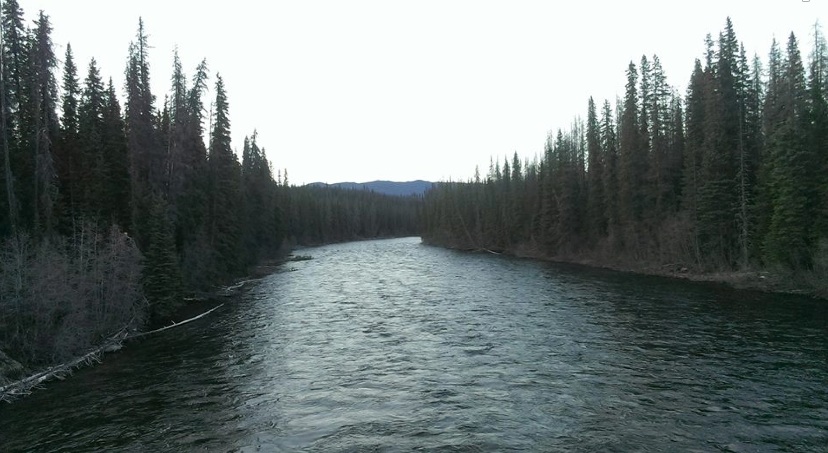Heal the Land, Heal the People
Heal the Land, Heal the People

The seventh annual Unis’ot’en Action Camp happened July 13 to 17 this summer, followed by a new Indigenous Youth Art Camp, July 18 to 30. As their website explains, “The Unis’tot’en (C’ihlts’ehkhyu / Big Frog Clan) are the original Wet’suwet’en Yintah Wewat Zenli distinct to the lands of the Wet’suwet’en.” The Unist’ot’en are brilliant long-term thinkers, with the kind of intelligence and skills we need to all learn in an era of escalating climate change.
Freda Huson and her partner Dini Ze Toghestiy hold the action camp annually, creating a space of healing and learning that honours what it means to be human—to live together and co-exist with dignity, humbleness, humour, and an intelligence that is grounded in long-term thinking over many generations. Where short-term capitalist thinking has wrought the climate crisis that we currently find ourselves in as a planet, long-term thinking like that shown by Freda and Toghestiy holds our future, as a species, if we are to continue living on this planet in generations to come.
The Wedzin Kwah (also known as the Morice River) flows through the Unist’ot’en Camp, providing clean drinking water that does not need to be treated in order to drink it. This is a rare and crucial reminder of what a healthy state of co-existence with the land and watershed involves; the people living along this river keep it clean. The Unist’ot’en are guardians who remind us of what commonly existed throughout Turtle Island before settlers (or unsettlers, depending on how you see it) arrived—a state of balance built on care and knowledgeable respect for the rivers and forests that make our lives possible.
Together over five days, participants worked on building the Unist’ot’en Healing Centre, ate meals provided by the land and its beings (hands up to the amazing Julia and all the volunteer cooks!), learned from one another through workshops, and enacted community on the land. The workshop topics included messaging, Indigenous self-care, settler solidarity, Internet security, growing food in greenhouses, fund-raising, carbon offsets and GMO trees, and more.
The Unist’ot’en and their supporters are working to raise thousands more dollars to complete the healing centre. All who care about the land and building better relations with Indigenous people have a joyful responsibility to support this work. To contribute from afar, see http://unistoten.camp/#donate.
Long-term thinking involves seeing the larger ecological relations that link different places. This global perspective was wisely demonstrated in Mel Bazil’s workshop on the dangers posed by carbon offsets, which have often served to dispossess Indigenous peoples rather than supporting them. Any proposed solutions to climate change need to pass the first test of whether they support Indigenous peoples living on their homelands, enacting the relations that need to exist between people and the land, or whether they further alienate Indigenous peoples from right livelihood.
During the camp, Yvonne Tupper also offered a moving update from Treaty 8 First Nations who recently held their eleventh annual Paddle to protect the Peace River Valley from being flooded and destroyed by the Site C dam. They are gearing up for the next court hearing, which will occur Sept 12 in Montreal.
Cities rely on the unjust sacrifices of places that seem far away, but are integral to the daily fabric of our urban lives. For instance, roughly a third of the electricity used in Vancouver comes from WAC Bennett dam on the Peace River, which flooded and destroyed the homelands of the TseKehNay, among others. Those who use BC’s electricity grid owe a debt to those who live in the Peace River watershed, and this is why many are standing with them in their efforts to protect the Peace River from the unnecessary Site C dam, which would destroy rich agricultural land that could feed a million people.
Those of us who live in cities have a real stake in living more ethically, without destroying the forests and farmlands that we also need for the health of the planet. We have a responsibility to give back, to reciprocate, and to build better relations than the divide-and-conquer set-up imposed by colonial thinking. We are capable of better, as human beings, and finding out how to achieve this better path is a more meaningful purpose for this society than short-term profit at the expense of future generations.
The Unist’ot’en Action Camp stands steadfast where it is, simultaneously healing people and land while obstructing numerous pipeline proposals. While this year may have been quieter than last year’s camp, everyone is well aware that things could easily heat up again if the prices for fracked gas (which poisons water) rise again. So, this year feels like a time to re-gather and plan for the world that is both possible and necessary, one that is guided by an ethics of giving back to the earth and one another, rather than destroying the one home planet we have through ceaseless extraction and cancerous growth. Slowing down and returning to voluntary simplicity is a necessary part of humanity’s path forward, as enacted with beautiful precision by the Unist’ot’en.

